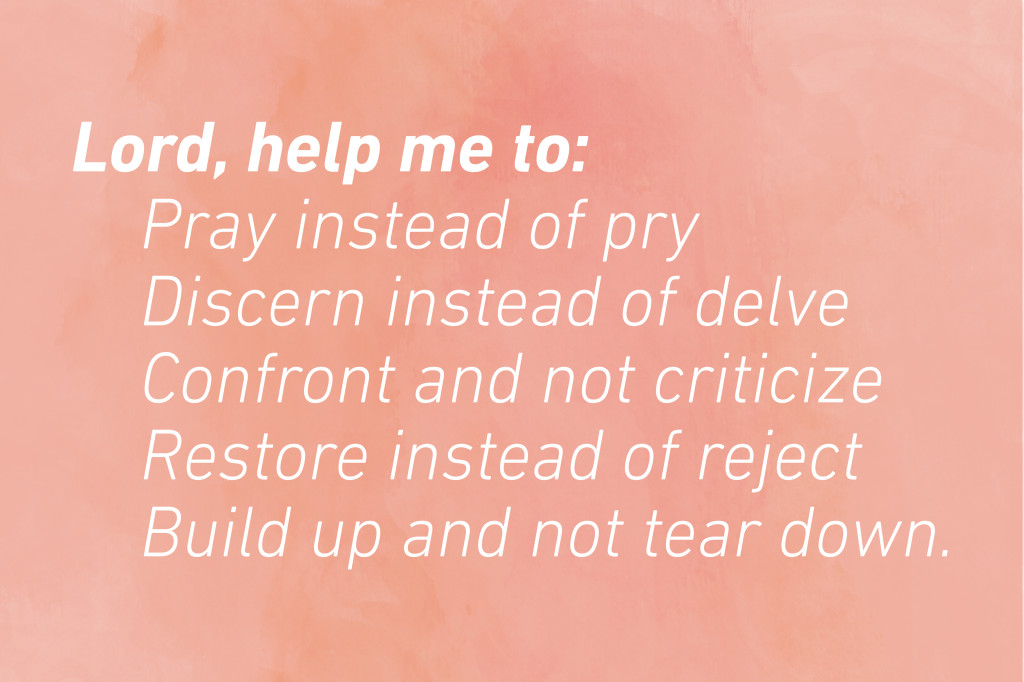I was sitting at Mom’s bedside in the hospital as the news of Tullian Tchividjian’s resignation began to hit the news. Heartbroken, I was trying to find the words to make sense of everything when I stumbled upon a piece from mom’s old writings.
I’m so thankful for this classic parcel of wisdom she penned years ago. It seems she could have sat down and written it just today after looking at the newsfeed…that’s when you know Mom’s wisdom is transcendent. May her words speak and powerfully minister to you as they have to me today.
Mercy and Truth by Hazel Hoskins
Swirling about us today in unprecedented number are revelations of indiscretion, immorality, and misrepresentations of truth. Unfortunately, these sins are not only prevalent in the highest echelons of government and business, but in the church world as well. Blasted into our homes by the media and preached about from the pulpits across our land, these disclosures leave us bewildered and saddened.
All too often, reaction to upheaval causes a drawing up of sides, a polarity of views. In politics, partisan lines of conservatism and liberalism are quite clearly defined. But in the religious world, the pendulum of faith swings from one extreme to the other.
On the one hand, the self-righteous, pharisaical attitude says of the transgressor, “Have no dealings with him. Let him alone. He’s made his bed, let him lie in it.”
On the other hand, the extreme permissive attitude says, “Anything goes. God’s grace covers all. God has forgiven him, and so should I.” (Even though there may have been no evidence of true repentance)
What should the stance of the church be in such a predicament?
Tucked away in the Psalms are two words that, if applied, would answer this question and bring healing and balm both to the church and the errant one. The coupling of these two words, directly or indirectly, is seen scores of times in the Scripture.
MERCY AND TRUTH are met together; righteousness and peace have kissed each other Psalm 85:10
MERCY and truth
Blessed are the merciful; for they shall obtain mercy Matthew 5:7
When hearing of the fall of a fellow Christian, our attitude should be one of mercy mixed with sorrow; “anguish in place of anger.”[1]
This was Nehemiah’s reaction upon hearing of the broken-down walls and burned gates in Jerusalem: to “sit down, weep, and mourn”.
Although the palace was many days’ journey from Jerusalem, his first concern was what was happening in that city. When he made his petition to God on behalf of the children of Israel, he included himself. “Both I and my father’s house have sinned. We have dealt very corruptly against thee, and have not kept the commandment” Nehemiah 1:7.
For Nehemiah, this time of reproach was also a time of self-examination. So it should be with us.
“Lord, search my heart. See if there be some wicked way in me.”
The Scripture tells us: “All we like sheep have gone astray: we have turned every one to his own way” Isaiah 53:6. Our “own way” may not include the sins of adultery and fornication, but Galatians 5 states hatred, wrath, and strife will also prohibit entrance into the kingdom of God.
I read a letter by Donald Gee, the great English Pentecostal statesman, written to Stanley Frodsham, then editor of the Pentecostal Evangel. He mentioned a rift in England between brethren. In response to this “tussle”, Donald Gee said, “(it) made me sick.” During the whole process, he kept busy praying for himself, that his own spirit would be right. “There is so much high talk about standing for righteousness,” said Gee, “but it seems to me that we can even do that in a wrong spirit.”[2]
This merciful attitude, which leads to self-examination, is illustrated in Jesus’ conversation with the accusers of the adulterous woman. He told them, “If any one of you is without sin, let him be the first to throw a stone at her” John 8:7. When the accusers had all gone away, because not one could thus condemn the woman, Jesus told her, “Neither do I condemn you. Go now and leave your life of sin” (vs. 11)
From the cradle to the grave, we will all war against our penchant for sin. Robert Robinson, the hymn writer, expressed it in these words:
Prone to wander, Lord, I feel it
Prone to leave the God I love…
So let us not adopt an unmerciful, “holier than thou” attitude, but implore God for personal cleansing daily and keep a right spirit in our own hearts.
Mercy and TRUTH
And ye shall know the truth, and the truth shall make you free” John 8:32
The only path to freedom and deliverance for the wrongdoer is to repent, confess his sin, and turn to God. Without godly confession and true admission of guilt, we short-circuit God’s power in our lives to be all He wants us to be.
W. Ross Foley, in You Can Win Over Weariness, quotes psychologist O. Hobart Mowrer:
“I am persuaded that healing and redemption depend much more upon what we say about ourselves to others . . . than upon what others say to us. It is the truth we ourselves speak, rather than the treatment we receive, that heals us.”
Foley says further, “Confession that breaks the shroud of our secrecy and leads us out into the open before God and a group of significant other people will liberate us from fear and guilt in a way that nothing else can.”[3]
But do we in the body of Christ create a climate for the transgressor to be truthful?
Too often, the transgressor finds himself drowning in a quagmire of criticism, unforgiveness, and rejection. Galatians 6:1 states that we are to gently restore the one who is taken in a fault. The very nature of sin is death, so the sinner has already wounded himself. It is the job of the church to restore this fragile one—and to do so gently. To rehabilitate means “to bring back to the original state.” This cannot be done if the wrongdoer is isolated, ignored, or ridiculed.
How do we respond when an errant brother confesses a fault?
Frequently, I fear, the story is immediately carried to someone else, who then calls a third party: “I just had to share this with you so you could pray with me about Brother so-and-so. Isn’t it just terrible?” Then the sordid details are spread around, and the poor sinner is banished from the body, resolving never to bare his soul again.
The scriptural pattern would be for the first brother to pray with the transgressor until he repented and was restored, without disclosing the problem to anyone else.
Years ago my dad, an old-time Pentecostal preacher, discovered a pastor from a neighboring town was having an affair. Dad went directly to this brother and confronted him with his sin. He confessed, repenting with tears. Then, at my father’s suggestion, he and his family moved out of the state. This man was later restored to an even greater ministry. My dad’s merciful confrontation brought him to a place of truthful confession and repentance.
Of course, if this brother had refused to confess his sin when confronted, and persisted in his sin, then my father’s obligation to restore would have been finished. For 1 Corinthians 5:11 tells us not to associate with a brother who chooses a life of immoral activity. But this isolation treatment is to be used only after every effort to restore has been exhausted. Didn’t Jesus say to forgive seventy times seven?
Nehemiah didn’t just sit around weeping and bemoaning the fate of Israel. He set about to rebuild the walls, and succeeded in this formidable task. Israel went “from reproach to rejoicing” in 52 days! It’s amazing what God can do with one person whose heart is broken before Him, and who has the courage and vision to follow God’s command.
There are practical things we can do in a ministry of restoration. Call the hurting Christian. Be a friend. Send a card or letter. Has a ministry been lost? Has the family’s source of income been cut off? Is there a wounded spouse? What can you do to help in the time of need? Make yourself available. Let the hurting ones know you are praying. If possible, include them in a small prayer group.
Above all, pray, pray, pray, and don’t give up. This is a spiritual battle that must be fought on our knees. Will you join me in this prayer?
When MERCY and TRUTH are met together . . .
Then righteousness and peace will kiss each other.
You will also enjoy reading:





1 Comment
[…] In light of Tullian Tchividjian’s resignation, Rob Hoskins shares a timely word from His Mom: The Christian Response. […]